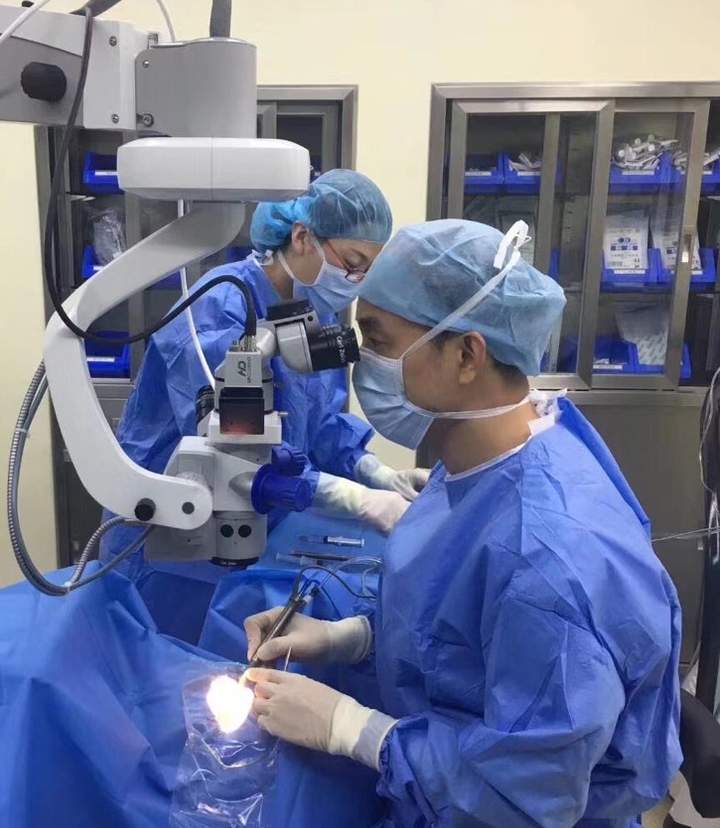
"Doctor, can I have an individualized plan for my refractive eye surgery?"
This is often the first question that many patients would ask when they want to eliminate dependency on eyeglasses or contact lenses. With patients' increasing demand for better vision, the possibility to have an individualized surgery plan has become crucial for many people to choose their surgeons.

Dr. HAN Wei, Vice Chair of SAHZU Ophthalmology and Director of Refractive Surgery Division, said that despite patients' various conditions, his division focuses on providing comprehensive and thorough preoperative examinations and a scientific, reasonable, and individualized refractive eye surgery for each patient. "There is no best, only the most suitable refractive surgery for you." Said Dr. HAN.
Deterioration of Eyesight
31-year-old Mr. ZHAO, has nearsightedness (myopia) since he was a student, and his myopia level has been measured at -6.00 diopters in both eyes since he became an adult. However, during the past six months, he felt a progressive decrease in vision in his left eye and increased fatigue in both eyes. "Since last month, I started to have trouble seeing at night when driving, and even on sunny days outdoors, my vision is blurred." Because of his heavy work load, Mr. ZHAO naturally thought it was just deterioration of myopia and intended to visit the eye clinic afterwards.
Unexpected Diagnosis
However, after having examinations at SAHZU Eye Center, Mr. ZHAO was shocked by his diagnosis. He was told by Dr. HAN that although the degree of myopia in both of his eyes has not changed, but the best-corrected visual acuity of his left eye might be only 0.6, and the reason is that Mr. ZHAO's left eye is diagnosed with a common eye blinding disease often seen in the middle-aged and elderly - Cataract. Mr. ZHAO doesn't understand. How could he suffer from this "old-man" disease when he just turned thirties?
Generally speaking, cataract is usually age-related and manifested by a clouding of the lens, and tend to be refered as senile cataract. It is very rare for Mr. ZHAO to develop cataract at his age, which may be caused by harmful environmental factors, such as excessive exposure to ultraviolet light or radiation from computer, cell phone or other video terminals, as well as eye trauma, inflammation, and poor dietary habits.
Individualized Surgery Plan
"On top of his myopia, cataract has already affected his daily life and has to be treated early. For him, a cataract surgery combined with multifocal intraocular lenses implantation to correct both of the disease and the eyesight could solve his eye problem at once." In addition, as Mr. ZHAO only has cataract in his left eye and myopia in the other, he might have severe anisometropia (different refraction of eyes) after the surgery for one single eye. Therefore, Dr. HAN suggests a small incision lenticule extraction to correct the refractive error of Mr. ZHAO's right eye so as to maintain the visual balance of both eyes after the surgery.
Following the surgical plan designed by Dr. HAN, Mr. ZHAO underwent ultrasound phacoemulsification cataract surgery on his left eye and the small incision lenticule extraction on his right eye, and his visual acuity reached over 1.0 in both eyes after the surgery.
Having gotten rid of cataract and myopia at one time, Mr. ZHAZO was very satisfied with the results of the surgery.
Cataract surgery and the small incision lenticule extraction may seem to be completely different surgeries, but their goal is the same -- to change the refraction of the eye. With the rapid development of ophthalmic technology today, refractive and cataract surgery are becoming more and more closely integrated, which Dr. HAN has much to talk about. In more than 20 years of his clinical, teaching and research work in ophthalmology, he has accumulated rich clinical experience in laser surgery to correct myopia, ICL surgery, cataract surgery, etc. He has led his team to achieve a number of research results and completed more than 40,000 cases of various types of refractive eye surgery.
"Modern refractive eye surgery is not limited to laser correction of myopia, hyperopia and astigmatism, but also includes ICL implantation and ultrasound phacoemulsification cataract surgery combined with multifocal and toric intraocular lens implantation, all of which are advanced techniques that can be used to precisely treat all types of refractive errors." Commented by Dr. HAN.
Written by DUSHI KUAIBAO
Translated by SAHZU International Affairs Office
Author: LI JING | Reviewer: LI JING | Editor: LI JING | Source: DUSHI KUAIBAO | Date:2021-10-20 | Views:![]()
![]()